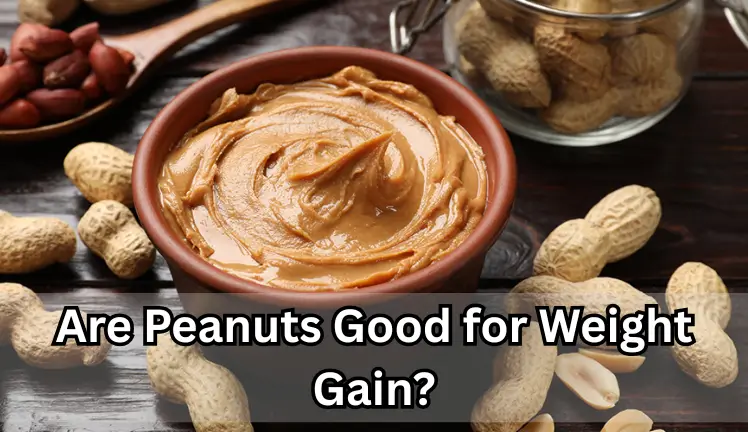Are Peanuts Good for Weight Gain? Weight gain, often perceived as a simple increase in calories, involves thoughtful food choices. If you’re aiming to gain weight in a healthy, sustainable way, peanuts might just be your secret weapon. Rich in calories, healthy fats, protein, and fiber, peanuts offer a nutrient-dense option that can support healthy weight gain when consumed mindfully.

Nutritional Value of Peanuts
Peanuts are technically legumes but have nutritional characteristics similar to tree nuts. Here’s what makes them valuable:
| Nutrient | Per 100 grams |
|---|---|
| Calories | 567 kcal |
| Protein | 25.8 g |
| Fat | 49.2 g (mostly unsaturated) |
| Carbohydrates | 16.1 g |
| Fiber | 8.5 g |
| Magnesium | 168 mg |
| Vitamin E | 8.3 mg |
| Niacin (B3) | 12.1 mg |
Peanuts also contain small amounts of iron, potassium, phosphorus, zinc, and B vitamins. This nutritional profile makes them one of the most energy-dense plant-based foods available.
Why Peanuts Are Excellent for Weight Gain
1. Calorie Dense
To gain weight, you must consume more calories than you burn. Peanuts provide over 560 calories per 100 grams, making it easy to reach your calorie surplus without feeling overstuffed.
2. Healthy Fats
Peanuts contain monounsaturated and polyunsaturated fats, which support heart health while contributing to calorie intake. These fats are metabolically efficient and encourage muscle growth when combined with strength training.
3. Protein-Rich
Peanuts are one of the best plant-based sources of protein, which is essential for muscle mass and tissue repair. Protein helps ensure that the weight you gain is lean mass rather than fat.
4. Satiety With Energy
Despite being filling, peanuts still allow for a calorie surplus due to their energy density. This helps prevent overeating junk food while still aiding weight gain.
5. Versatile in Meals
From peanut butter to roasted peanuts and energy bars, you can incorporate peanuts into a variety of meals and snacks throughout the day.
Best Ways to Eat Peanuts for Weight Gain
Roasted Peanuts
Dry-roasted peanuts are flavorful and can be eaten as a snack between meals. They provide healthy fats and protein without added sugar.
Peanut Butter
One tablespoon of natural peanut butter has around 90–100 calories. Add it to smoothies, toast, oatmeal, or even protein shakes.
Peanut-Based Energy Bars
Homemade granola or energy bars using oats, honey, and peanuts are perfect for a healthy snack loaded with calories.
Peanut Chutney & Sauces
Peanut-based sauces or chutneys can be included in meals to increase calorie content while adding flavor.
Daily Peanut Intake for Weight Gain
While peanuts are beneficial, moderation is key. Here’s a safe guideline:
- 30 to 50 grams per serving, 2 to 3 times per day is typically sufficient for healthy weight gain.
- That translates to a handful of peanuts or 2 tablespoons of peanut butter per serving.
Avoid excessive intake, especially salted or sweetened varieties, which may raise sodium or sugar levels unnecessarily.
Peanuts vs. Other Weight Gain Foods
| Food | Calories (per 100g) | Fat | Protein | Sugar |
|---|---|---|---|---|
| Peanuts | 567 | High | High | Low |
| Almonds | 579 | High | Moderate | Low |
| Cheese | 402 | High (saturated) | High | Very Low |
| Bananas | 89 | Low | Low | High |
| Avocado | 160 | High (healthy) | Moderate | Very Low |
Why peanuts win: They offer a balance of protein, healthy fats, and fiber, making them more effective for healthy weight gain compared to sugary or fatty alternatives.
Potential Concerns and How to Avoid Them
Overeating Salted or Sweetened Peanuts
Salted and sugar-coated peanuts can spike sodium or sugar intake, leading to water retention or metabolic issues.
Solution: Choose dry-roasted or raw peanuts without additives for best results.
Allergies
Peanut allergies are serious and can be life-threatening. Always ensure you’re not allergic before incorporating them into your diet.
Weight Gain Without Exercise
Gaining weight without physical activity might lead to fat accumulation. Pair peanut intake with strength training to ensure muscle mass development.
Peanut Butter: A Superfood for Weight Gain?
Natural peanut butter (with no hydrogenated oils or added sugar) is:
- Calorie-rich: One spoon = 90–100 kcal
- Protein-rich: 4–5 grams per spoon
- Easily combinable with smoothies, whole grain bread, protein shakes, bananas, etc.
Peanut butter offers slow-releasing energy and keeps you full longer, reducing junk food cravings.
When to Eat Peanuts for Best Results
- Morning: Add to your breakfast oatmeal or smoothies.
- Mid-Morning Snack: Handful of roasted peanuts.
- Pre-Workout: Gives lasting energy.
- Post-Workout: Combine with carbs for muscle recovery.
- Before Bed: Helps sustain muscle protein synthesis overnight.
Who Should Avoid Peanuts for Weight Gain?
- People with nut allergies
- Individuals with gastrointestinal issues (may be hard to digest in large quantities)
- Those on low-fat or kidney-specific diets
Expert Tips for Healthy Weight Gain with Peanuts
- Pair peanuts with calorie-dense carbs like bananas, oats, or whole wheat bread.
- Eat them consistently — daily intake is key for results.
- Avoid fried versions — go for dry-roasted or boiled peanuts.
- Drink enough water to aid digestion due to their fiber content.
- Mix with ghee or jaggery for traditional Indian high-calorie snacks.
Final Verdict: Are Peanuts Good for Weight Gain?
Yes — absolutely. Peanuts are not just good but excellent for healthy weight gain. They’re affordable, accessible, and versatile, offering a powerful combination of calories, protein, and healthy fats. When consumed in the right amounts and combined with regular exercise, peanuts can help you gain weight naturally and build lean muscle.
FAQs: Peanuts and Weight Gain
Do peanuts cause fat gain or muscle gain?
Peanuts support muscle gain when combined with exercise due to their high protein and healthy fat content. Without exercise, weight gain may be more in fat.
How much peanut should I eat to gain weight?
Consuming 30–50 grams of peanuts 2–3 times a day is ideal for weight gain. You can also include 2 tablespoons of peanut butter daily.
Are peanuts better than almonds for gaining weight?
Peanuts have slightly fewer calories than almonds but are more affordable and equally effective, especially when eaten consistently.
Can I eat peanuts before bed?
Yes, peanuts before bed may support overnight muscle recovery and provide steady energy release.
Is peanut butter good for skinny people?
Absolutely. Peanut butter is calorie-rich and helps skinny individuals gain weight gradually while maintaining nutritional balance.
Disclaimer:This article is for informational purposes only and does not substitute professional medical or dietary advice.






